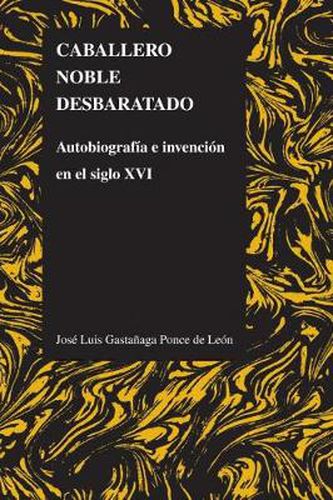Readings Newsletter
Become a Readings Member to make your shopping experience even easier.
Sign in or sign up for free!
You’re not far away from qualifying for FREE standard shipping within Australia
You’ve qualified for FREE standard shipping within Australia
The cart is loading…






First-person narrative does not always fall under the genre of autobiography. In the centuries before the genre was defined, authors often patterned their personal narratives after prestigious discourses, such as hagiography, historiography, and the literary miscellany. Caballero noble desbaratado: Autobiografia e invencion en el siglo XVI (Noble Knight Disrupted: Autobiography and Invention in the Sixteenth Century) analyses several first-person narratives from Spain and the conditions of their writing and reception. It focuses on the sixteenth-century Libro de la vida y costumbres (Book of Life and Customs) by Alonso Enriquez de Guzman (1499-1547), the knight of the title.
One chapter looks at antecedents to the central work: the late fourteenth-century by Leonor Lopez de Cordoba, who narrates difficult passages of her life; the Brief Summary of the Life and Deeds by Diego Garcia de Paredes, who speaks of duels and battles as an object lesson in honor and courage for his son; and Cautiverio y trabajos Captivity and Travails by Diego Galan, a tale of captivity and flight in Muslim lands that constitutes an early example of fictionalised autobiography. The study also examines the influence of writers like Bartolome de Torres Naharro, Antonio de Guevara, and Pedro Mexia and the vitality of lyric poetry on both sides of the Atlantic.
Although the Biblioteca de Autores Espanoles has devoted a volume to Enriquez de Guzman, there has never been a book-length study dedicated to this author. This book fills that gap and constitutes a valuable contribution to the study of autobiography in Spanish.
$9.00 standard shipping within Australia
FREE standard shipping within Australia for orders over $100.00
Express & International shipping calculated at checkout
First-person narrative does not always fall under the genre of autobiography. In the centuries before the genre was defined, authors often patterned their personal narratives after prestigious discourses, such as hagiography, historiography, and the literary miscellany. Caballero noble desbaratado: Autobiografia e invencion en el siglo XVI (Noble Knight Disrupted: Autobiography and Invention in the Sixteenth Century) analyses several first-person narratives from Spain and the conditions of their writing and reception. It focuses on the sixteenth-century Libro de la vida y costumbres (Book of Life and Customs) by Alonso Enriquez de Guzman (1499-1547), the knight of the title.
One chapter looks at antecedents to the central work: the late fourteenth-century by Leonor Lopez de Cordoba, who narrates difficult passages of her life; the Brief Summary of the Life and Deeds by Diego Garcia de Paredes, who speaks of duels and battles as an object lesson in honor and courage for his son; and Cautiverio y trabajos Captivity and Travails by Diego Galan, a tale of captivity and flight in Muslim lands that constitutes an early example of fictionalised autobiography. The study also examines the influence of writers like Bartolome de Torres Naharro, Antonio de Guevara, and Pedro Mexia and the vitality of lyric poetry on both sides of the Atlantic.
Although the Biblioteca de Autores Espanoles has devoted a volume to Enriquez de Guzman, there has never been a book-length study dedicated to this author. This book fills that gap and constitutes a valuable contribution to the study of autobiography in Spanish.